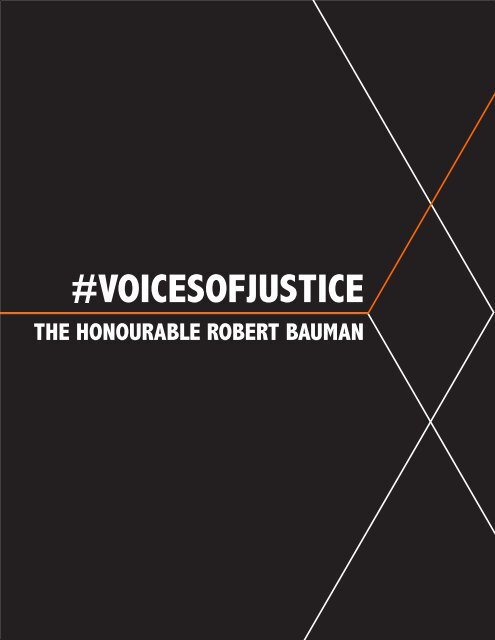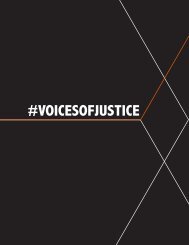Chief Justice Robert Bauman – The Justice Hack – Voices of Justice Magazine 2021
A conversation with the Honourable Robert Bauman, Chief Justice of British Columbia, for Voices of Justice, a project that discusses access to justice in British Columbia.
A conversation with the Honourable Robert Bauman, Chief Justice of British Columbia, for Voices of Justice, a project that discusses access to justice in British Columbia.
Create successful ePaper yourself
Turn your PDF publications into a flip-book with our unique Google optimized e-Paper software.
#VOICESOFJUSTICE<br />
THE HONOURABLE ROBERT BAUMAN<br />
#VOICESOFJUSTICE
CHIEF JUSTICE ROBERT BAUMAN
WE ARE REALLY THE TAIL IN THIS<br />
WHOLE PROCESS, AND WE SHOULDN’T<br />
BE WAGGING THE DOG<br />
<strong>The</strong> Honourable <strong>Robert</strong> <strong>Bauman</strong> is <strong>Chief</strong> <strong>Justice</strong> <strong>of</strong> British Columbia,<br />
the British Columbia Court <strong>of</strong> Appeal and Court <strong>of</strong> Appeal <strong>of</strong> Yukon.<br />
What is Access to <strong>Justice</strong> BC, why did it start and what are its goals?<br />
It’s really created a platform <strong>of</strong> people interested in justice issues<br />
across the spectrum. It includes lawyers and judges, and other leaders<br />
<strong>of</strong> the legal pr<strong>of</strong>ession. It also includes representatives from the<br />
Ministry <strong>of</strong> Attorney General, members <strong>of</strong> the public, lay litigants who<br />
would represent themselves in proceedings, business people from the<br />
chamber <strong>of</strong> commerce, notaries, elected politicians, and representatives<br />
<strong>of</strong> First Nations and local governments.<br />
It’s a tremendously broad section <strong>of</strong> the greater public in British<br />
Columbia. And really, that’s what’s critical to the movement <strong>–</strong> the fact<br />
that it is widely based and welcoming <strong>of</strong> all different points <strong>of</strong> view and<br />
perspectives. In this type <strong>of</strong> social issue where we’re trying to galvanize<br />
a movement towards some meaningful solutions, it seems to me the<br />
broader the tent, the better. And so we’ve been getting larger and larger<br />
and larger, and I suspect that’s what we’ll continue to do.<br />
It’s created this forum in which all these various people with competing<br />
interests and complimentary interests can come together and discuss<br />
ways <strong>of</strong> addressing what is indeed a crisis in our country, and that is<br />
the ability <strong>of</strong> citizens to access the justice system in a meaningful way:<br />
knowing your legal rights and being able to exercise them.<br />
#VOICESOFJUSTICE
What has been the impact <strong>of</strong> Access to<br />
<strong>Justice</strong> BC’s Triple Aim, and what are<br />
some projects that may have followed the<br />
Triple Aim template?<br />
<strong>The</strong> Triple Aim is a reflection <strong>of</strong> my belief<br />
that words matter, and common vision<br />
matters. It’s easy to be cynical and say,<br />
“Well, those are just words. That’s the<br />
vision, where’s the reality?” And we hear<br />
that, but the fact is that a common vision,<br />
which people can rally around, is an<br />
extremely important concept, an extremely<br />
important development and extremely<br />
important accomplishment. That’s what the<br />
Triple Aim is. It’s something that over 50<br />
justice organizations and individuals have<br />
subscribed to as being a common vision <strong>of</strong><br />
ways <strong>of</strong> improving the system and what we<br />
want to see in a justice system.<br />
A lot <strong>of</strong> our progress so far has been<br />
consciousness raising, momentum building.<br />
We haven’t resolved the access to justice<br />
challenge in British Columbia and Canada by<br />
any means. Some would say we’re not being<br />
very quick and doing so at all. I hear that,<br />
but the fact is, we built I think a momentum<br />
in this province around a vision for action in<br />
this area. We’ve also created measurement<br />
techniques for determining if we are<br />
making progress. It provides for common<br />
measurement, which, <strong>of</strong> course, is critical,<br />
so that we’re always comparing apples and<br />
apples.<br />
What is the significance <strong>of</strong> Access to<br />
<strong>Justice</strong> BC’s four pillars (being usercentred,<br />
collaborative, experimental and<br />
evidence-based)?<br />
<strong>The</strong>y really say it all. I think the usercentred<br />
aspect <strong>of</strong> our vision is probably the<br />
most important, because it takes away the<br />
traditional view that judges and lawyers are<br />
what matter in this system, and therein lies<br />
the hope for reform. It turns that on its head,<br />
as it should be, to concentrate on who we’re<br />
all working for, and that is the people who<br />
use our system. And to the extent our system<br />
isn’t comfortable for those who use it, we<br />
failed; isn’t accessible for those who use it,<br />
we failed.<br />
Evidence-based is important. Experimental<br />
also is a critical core for me. That is a<br />
willingness to say to ourselves, “Our<br />
existing efforts are wanting, they are not<br />
answering the challenge, at least in the 21st<br />
century.” We have to be prepared to test<br />
new initiatives, we have to be willing to<br />
open ourselves up to experimenting in areas<br />
where our innate conservatism is challenged.<br />
I’m as conservative as anybody else in this<br />
pr<strong>of</strong>ession. I value the oldest institutions<br />
as much as anybody else does. But I also<br />
recognize that unless we are open to new<br />
ideas <strong>–</strong> and some <strong>of</strong> them will be radical and<br />
disruptive <strong>–</strong> we’re bound to simply repeat<br />
our mistakes in the past.<br />
What do you think is the most important<br />
next step for the pr<strong>of</strong>ession in terms <strong>of</strong><br />
increasing access to justice?<br />
I think awareness <strong>of</strong> the problem is step one.<br />
Everyone knows that there is a problem.<br />
A willingness to be part <strong>of</strong> the solution,<br />
as opposed to simply acknowledging the<br />
problem and moving on to our daily lives,<br />
comes next. <strong>The</strong>re are lots <strong>of</strong> comfortable<br />
pews in the legal pr<strong>of</strong>ession where you can<br />
practice your entire life without worrying<br />
about any <strong>of</strong> these problems.<br />
But the fact is, I think lawyers are generally<br />
starting to become aware <strong>of</strong> the problem,<br />
and willing to become part <strong>of</strong> the solution. A<br />
willingness to try something new is critical.<br />
Disruptors prompt our imagination <strong>–</strong> the<br />
people who say, “Why not? Or what if?” as<br />
opposed to, “That’s not the way we do things.”
I’ve seen leadership in this area coming from<br />
major firms. Without being cynical, they<br />
know that it’s in their interest to get involved<br />
in this area. I’m seeing major firms taking an<br />
active interest in the new legal landscape,<br />
and a leadership interest in that area. And<br />
that’s great, because they’ve got the resources,<br />
and frankly, they’ve got the talent to be<br />
leaders in this area, and they’re stepping up.<br />
<strong>The</strong> Court <strong>of</strong> Appeal has itself been innovative<br />
and disruptive in this area. Why<br />
was change important and what allowed<br />
change to happen quickly?<br />
We’re a really radical bunch here! But seriously,<br />
it was kind <strong>of</strong> a no-brainer. Necessity<br />
breeds innovation, and we certainly had<br />
necessity in March when everything shut<br />
down. So necessity prompted us to do things<br />
we might not normally do.<br />
Our rota is tremendously manageable, and<br />
for the most part, we do not hear evidence.<br />
We simply don’t face the challenges the trial<br />
courts do in that regard. That allowed us to<br />
pivot relatively quickly. I credit my colleagues<br />
with being flexible, and resilient. <strong>The</strong>y’ve risen<br />
to the occasion, to the challenges we face<br />
with a truly electronic record. And believe<br />
me, there are some challenges there.<br />
Has your idea <strong>of</strong> justice changed over the<br />
past five years since Access to <strong>Justice</strong> BC<br />
began its work?<br />
It has. I think the most important thing is to<br />
think about who’s at the centre <strong>of</strong> all this,<br />
and when you start thinking that way, all <strong>of</strong><br />
a sudden, we become less important, unfortunately.<br />
We are really the tail in this whole<br />
process, and we shouldn’t be wagging the<br />
dog. <strong>The</strong> courtroom is the last place that we<br />
end up in the system. And in many ways, at<br />
times it can be perceived to be a failure to<br />
end up in the courtroom. In the development<br />
<strong>of</strong> jurisprudence and important legal principles,<br />
the courtroom is not a failure. But<br />
for ordinary citizens, they may be forgiven<br />
for thinking they failed when they end up in<br />
court.<br />
So a concept <strong>of</strong> justice being much broader<br />
than the courtroom <strong>–</strong> and including understanding<br />
and knowing your legal rights,<br />
knowing when you have a legal issue, and<br />
an ability to understand its ramifications as<br />
a citizen <strong>–</strong> is what I’m talking about when I<br />
talk about access to justice. I see the judicial<br />
branch, which I have the privilege <strong>of</strong> leading<br />
in British Columbia, as being not the end part<br />
<strong>of</strong> the problem, but rather, I see us as being<br />
part <strong>of</strong> the leadership group that gets involved<br />
from the very beginning <strong>of</strong> the access<br />
issue. That makes us not only relevant, but<br />
more relevant, perhaps, to the whole issue<br />
than we’ve ever imagined ourselves.<br />
EVERYONE KNOWS THAT<br />
THERE IS A PROBLEM.<br />
A WILLINGNESS TO BE<br />
PART OF THE SOLUTION,<br />
AS OPPOSED TO SIMPLY<br />
ACKNOWLEDGING THE<br />
PROBLEM AND MOVING<br />
ON TO OUR DAILY LIVES,<br />
COMES NEXT<br />
#VOICESOFJUSTICE



